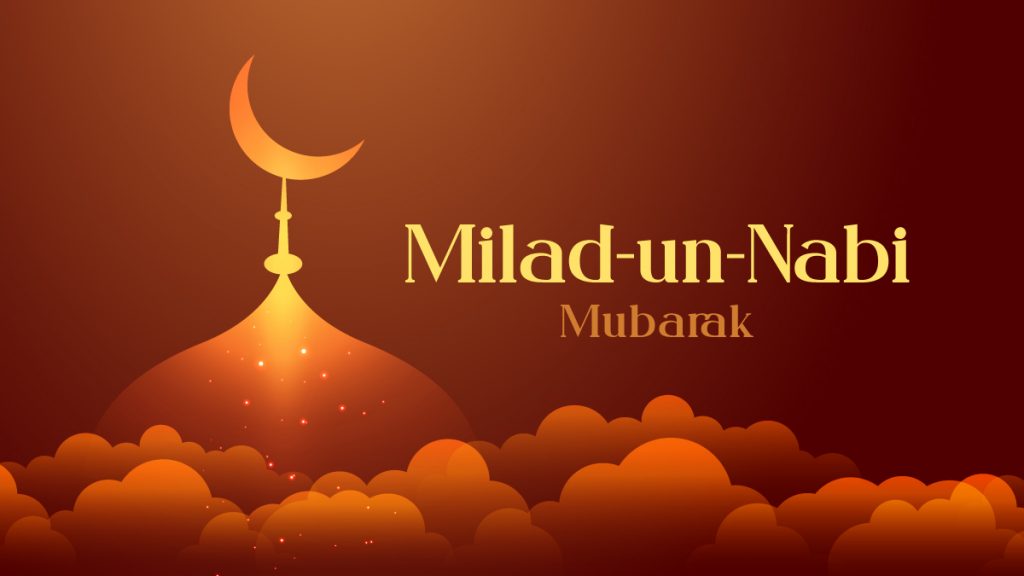Milad-un-Nabi, also known as Id-e-Milad, is an important Islamic festival commemorating the birth of Prophet Muhammad, the founder of Islam and the last prophet of God, according to Islamic belief. The festival is celebrated on the 12th day of Rabi’ al-Awwal, the third month of the Islamic lunar calendar. For many Muslims in India and around the world, Milad-un-Nabi is a time to reflect on the life and teachings of Prophet Muhammad, participate in prayers, processions, and sermons, and engage in acts of charity and kindness.
Milad-un-Nabi Dates for 2024, 2025, and 2026
Here are the dates for Milad-un-Nabi in the upcoming years:
| Year | Date | Day |
|---|---|---|
| 2024 | 16/09/2024 | Monday |
| 2025 | 05/09/2025 | Friday |
| 2026 | 25/08/2026 | Tuesday |
The Significance of Milad-un-Nabi
Milad-un-Nabi marks the birth anniversary of Prophet Muhammad, who was born in 570 CE in Mecca, in present-day Saudi Arabia. Prophet Muhammad is revered as the messenger of Allah and is believed to have brought the final revelation, the Quran, to humankind. His teachings form the foundation of Islam, and his life serves as a model for Muslims worldwide.
For those who celebrate Milad-un-Nabi, the day is an opportunity to reflect on the values of Islam – peace, compassion, tolerance, and humility – and to honour the Prophet’s contributions to humanity. The day is marked by gatherings in mosques, recitations of the Quran, and prayers seeking blessings and guidance.
While the festival is celebrated with great enthusiasm by many Muslims, particularly Sunni Muslims, some Islamic sects, such as Wahhabis and Salafis, consider the celebration of Milad-un-Nabi as an innovation that was not observed by Prophet Muhammad himself and thus refrain from celebrating it.
How Milad-un-Nabi is Celebrated
Milad-un-Nabi is celebrated in different ways across India, with each region adding its unique customs and traditions. The day typically includes religious and cultural activities aimed at honouring the Prophet and spreading the message of Islam.
- Prayers and Sermons: Devotees gather in mosques to offer special prayers (Salat) and listen to sermons (khutbah) that highlight the life and teachings of Prophet Muhammad. Religious scholars and community leaders speak about the importance of following the Prophet’s example in daily life.
- Recitation of the Quran: Quran recitations are a central part of the celebrations. Verses from the holy book are recited in mosques and homes to seek blessings and reflect on the guidance provided by the Prophet.
- Processions: In many cities, processions are held where large crowds of devotees march through the streets, carrying banners and flags, singing hymns (naats), and reciting praises of the Prophet. These processions are often vibrant and festive, with participants dressed in traditional attire.
- Charity and Acts of Kindness: Milad-un-Nabi is also a time for Muslims to engage in acts of charity and kindness. Devotees distribute food, clothing, and money to the poor and needy, reflecting the Prophet’s emphasis on helping the less fortunate.
Milad-un-Nabi in Different Parts of India
Milad-un-Nabi is celebrated with great fervour in various parts of India, particularly in regions with significant Muslim populations. The celebrations are marked by religious devotion, community gatherings, and festive processions.
- Hyderabad (Telangana): Hyderabad is known for its grand celebrations of Milad-un-Nabi, with large processions and gatherings taking place in the city. Mosques and streets are decorated with lights, and special sermons are delivered to commemorate the Prophet’s birth.
- Lucknow (Uttar Pradesh): Lucknow witnesses large processions and prayers in mosques and dargahs (shrines). Devotees participate in religious discourses, and the city’s streets are adorned with lights and banners.
- Mumbai (Maharashtra): In Mumbai, Milad-un-Nabi is celebrated with processions and prayers in mosques. Food and sweets are distributed to the poor, and the city’s Muslim community comes together to reflect on the teachings of the Prophet.
- Kolkata (West Bengal): Kolkata’s Muslim community marks Milad-un-Nabi with prayers, religious gatherings, and charity events. Mosques in the city host special sermons and Quran recitations to honour the Prophet.
Milad-un-Nabi – A Day of Devotion and Reflection
Milad-un-Nabi is a day of deep spiritual reflection and devotion for many Muslims. It is a time to remember the teachings of Prophet Muhammad, his role as a guide and leader, and his message of peace, compassion, and justice. The celebrations serve as a reminder to Muslims to embody the values of Islam in their daily lives and to continue the legacy of the Prophet by spreading kindness and goodwill.
While the celebrations of Milad-un-Nabi may vary from region to region, the essence of the festival remains the same – to honour the Prophet, seek blessings, and reaffirm one’s faith in Islam. Through prayers, sermons, and acts of charity, Muslims come together to celebrate the birth of the man who changed the course of history with his teachings and his dedication to spreading the word of Allah.
Popular FAQs about Milad-un-Nabi
- Is Milad-un-Nabi a public holiday in India? Yes, Milad-un-Nabi is a gazetted public holiday in India. It is observed in many states with significant Muslim populations, and schools, government offices, and businesses often close for the day.
- What is the significance of Milad-un-Nabi in Islam? Milad-un-Nabi marks the birth of Prophet Muhammad, the last prophet of Islam. It is a day to reflect on his life, teachings, and contributions to humanity, and to seek blessings through prayers and charitable acts.
- How is Milad-un-Nabi celebrated in India? Milad-un-Nabi is celebrated with prayers, sermons, Quran recitations, and processions. Many Muslims also engage in acts of charity, distributing food and clothing to the needy to honour the Prophet’s message of compassion.
- Why do some Muslims refrain from celebrating Milad-un-Nabi? Some Islamic sects, such as Wahhabis and Salafis, refrain from celebrating Milad-un-Nabi, as they consider it an innovation (bid’ah) that was not observed by Prophet Muhammad himself and thus believe it should not be celebrated.

